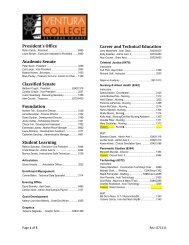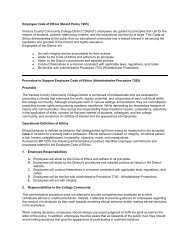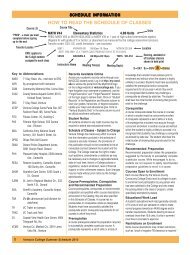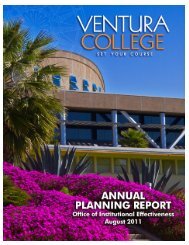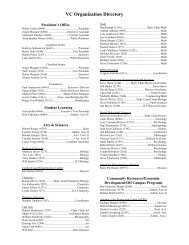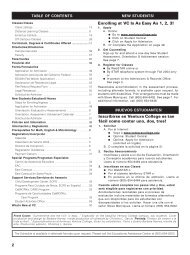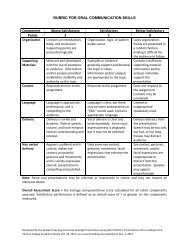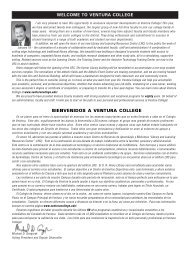2011 General CataloG & announCement of Courses - Ventura College
2011 General CataloG & announCement of Courses - Ventura College
2011 General CataloG & announCement of Courses - Ventura College
You also want an ePaper? Increase the reach of your titles
YUMPU automatically turns print PDFs into web optimized ePapers that Google loves.
GLOSSARY OF COLLEGE TERMS<br />
The following is <strong>of</strong>fered as an explanation <strong>of</strong> common terms used at <strong>Ventura</strong> <strong>College</strong>. You should be familiar with these key words, terms<br />
and phrases since you will read or hear them throughout your college experience. A counselor is also available to answer any questions.<br />
A.A., Associate in Arts: <strong>General</strong> degree granted by California<br />
Community <strong>College</strong>s.<br />
A.S., Associate in Science: Degree granted by California<br />
Community <strong>College</strong>s generally having more emphasis on two-year<br />
career and technical education than the A.A. degree.<br />
Academic Renewal: A process to have previous substandard<br />
college work (grades and credits) excluded from computation <strong>of</strong> the<br />
cumulative grade point average.<br />
Academic Year: Fall and Spring semesters, beginning with the<br />
start <strong>of</strong> the Fall term in August through the end <strong>of</strong> the Spring term in<br />
mid-May.<br />
Add: Formally adding a class(es) by completing the appropriate<br />
forms online or at the Admissions Office.<br />
Adding a Closed Class: Students seeking entry to classes that<br />
are closed at the time they register are referred to the instructor.<br />
Articulation: Contractual agreements between two or more<br />
schools. Articulation agreements between <strong>Ventura</strong> <strong>College</strong> and<br />
universities list the courses that transfer and that satisfy certain<br />
requirements.<br />
Assessment/Placement Test: Test given prior to registration<br />
for classes. The results are used to help students select appropriate<br />
classes.<br />
Bachelor’s Degree: Degree granted by four-year colleges and<br />
universities. Usually the Bachelor <strong>of</strong> Arts (B.A.) or the Bachelor <strong>of</strong><br />
Science (B.S.).<br />
BOGW: Board <strong>of</strong> Governors Enrollment Fee Waiver - a form <strong>of</strong><br />
financial aid that pays enrollment fees for eligible California students.<br />
By Arrangement: <strong>Courses</strong>, or part <strong>of</strong> a course, which include<br />
additional hours not yet scheduled.<br />
Certificate <strong>of</strong> Achievement: A document indicating that<br />
the graduate has satisfactorily completed the major courses in a<br />
program, but not the general education courses. A certificate is not<br />
a degree.<br />
Class Schedule: The listing <strong>of</strong> courses including hours, instructor<br />
and room assignments to be <strong>of</strong>fered each term. See Schedule <strong>of</strong><br />
Classes.<br />
Collaborative Learning: A method <strong>of</strong> instruction committed to<br />
actively engaging students in their learning using small groups, team<br />
and group projects, and providing opportunities for students to share<br />
common experiences and solve problems.<br />
Community Education Offerings: Fully fee-funded avocational<br />
and recreational classes. These <strong>of</strong>ferings carry no credit value.<br />
Corequisite: A course or courses in which a student must be<br />
concurrently enrolled. A corequisite represents a set <strong>of</strong> skills or a<br />
body <strong>of</strong> knowledge that a student must acquire through concurrent<br />
enrollment. Corequisites are indicated in the Class Listings <strong>of</strong> the<br />
Schedule <strong>of</strong> Classes and in the <strong>College</strong> Catalog.<br />
Counselor: Faculty who assist students with personal, career,<br />
avocational and educational planning and development.<br />
Course: An organized pattern <strong>of</strong> instruction in a specified subject<br />
<strong>of</strong>fered by the college.<br />
Course Description: A brief statement about the content <strong>of</strong> a<br />
particular course.<br />
Credit Course: A course for which units are granted.<br />
CRN: Course Reference Number listed in the Schedule <strong>of</strong> Classes.<br />
CSU: The California State University system, also called Cal State,<br />
consists <strong>of</strong> 23 campuses statewide.<br />
CSU GE-Breadth: <strong>General</strong> Education pattern for the CSU system.<br />
See Transfer Information.<br />
Curriculum: Course <strong>of</strong>ferings <strong>of</strong> the <strong>College</strong> as a whole; also<br />
refers to a group <strong>of</strong> required courses leading to a degree or<br />
certificate.<br />
Degree: A diploma granted by a college stating that the student<br />
has attained a certain level <strong>of</strong> ability in a specific field. The most<br />
common degrees are: 1) A.A. Associate in Arts; 2) A.S. Associate in<br />
Science; and 3) B.A./B.S. Bachelor's Degree (four-year).<br />
Dismissal: The procedure <strong>of</strong> dismissing a student from college<br />
for poor academic achievement, for incurring excessive withdrawals,<br />
or for disciplinary reasons. Often, dismissal is temporary, providing<br />
the student agrees to certain conditions. See this Catalog for more<br />
information.<br />
Drop: Withdrawing formally from a class in which a student is<br />
enrolled. It is the student’s responsibility to formally withdraw from<br />
a class. A student may drop a class online or in-person, or the<br />
instructor may initiate the drop. Contact the Admissions Office for<br />
more information and deadlines.<br />
Educational Work Load: <strong>General</strong>ly consists <strong>of</strong> 15 units <strong>of</strong><br />
work per semester in order to make normal progress towards the<br />
A.A./A.S. degree and/or transfer requirements.<br />
Elective: A course that is not specifically required for the major<br />
but which the student takes for unit credit, and which may count<br />
towards the total units required for the degree.<br />
Financial Aid: Money available from the federal or state<br />
governments or local sources to help meet college expenses.<br />
Financial aid can include grants, loans, scholarships, and work-study<br />
programs.<br />
Full-Time Student: A student who enrolls in and satisfactorily<br />
completes a minimum <strong>of</strong> 12 units. This status is important for<br />
financial aid eligibility and other special program requirements.<br />
<strong>General</strong> Education/Breadth Requirements: <strong>Courses</strong> that all<br />
students must satisfactorily complete to obtain a degree. Depending<br />
on the degree desired, these GE requirements vary. Current lists<br />
are available at the Counseling Office, in the <strong>College</strong> Catalog, in the<br />
Schedule <strong>of</strong> Classes, and on the <strong>College</strong> website.<br />
Good Standing: Indicates that the student’s grade point average<br />
is a “C”or better (2.0 or better).<br />
<strong>Ventura</strong> <strong>College</strong> Catalog 2010 - <strong>2011</strong> Glossary Terms 249



